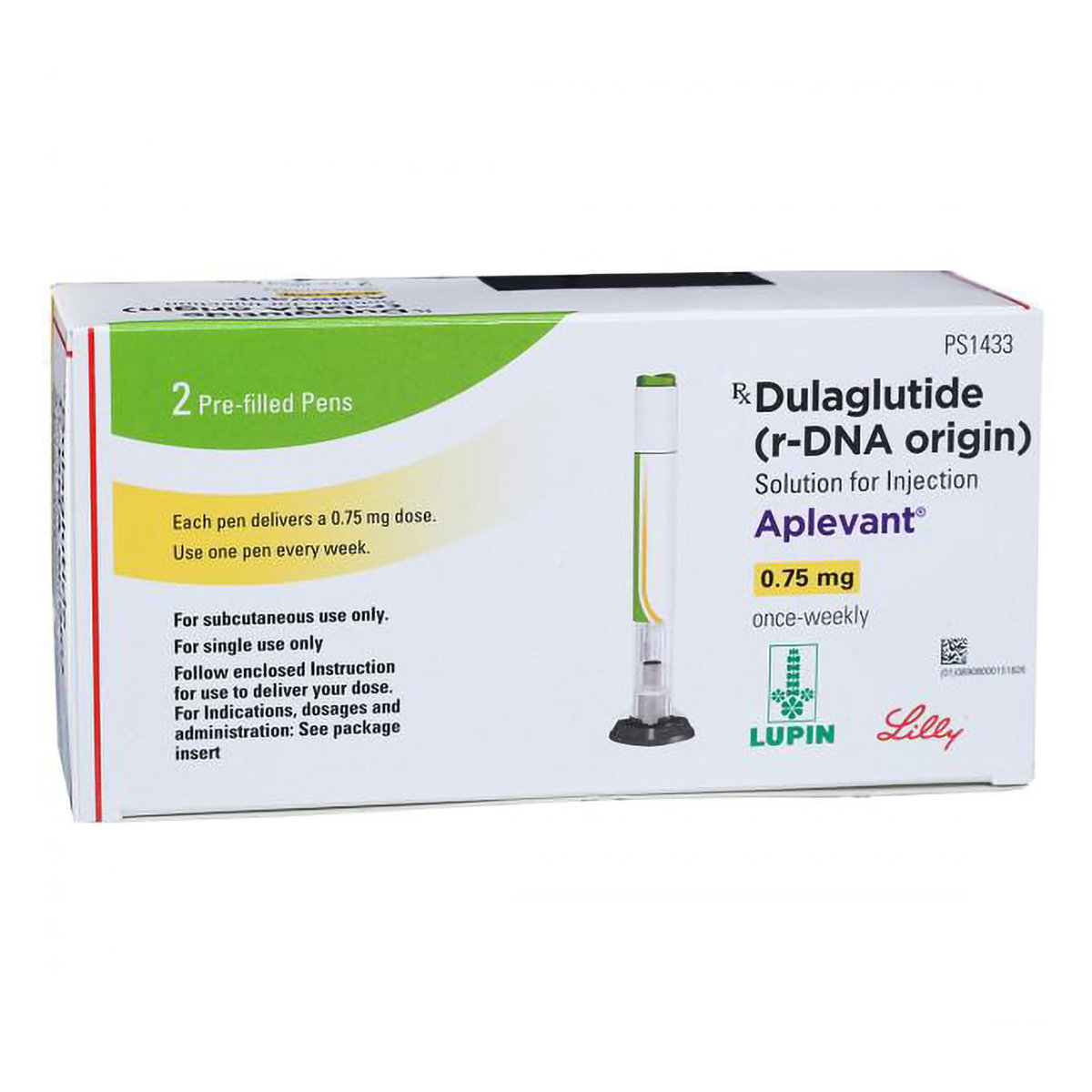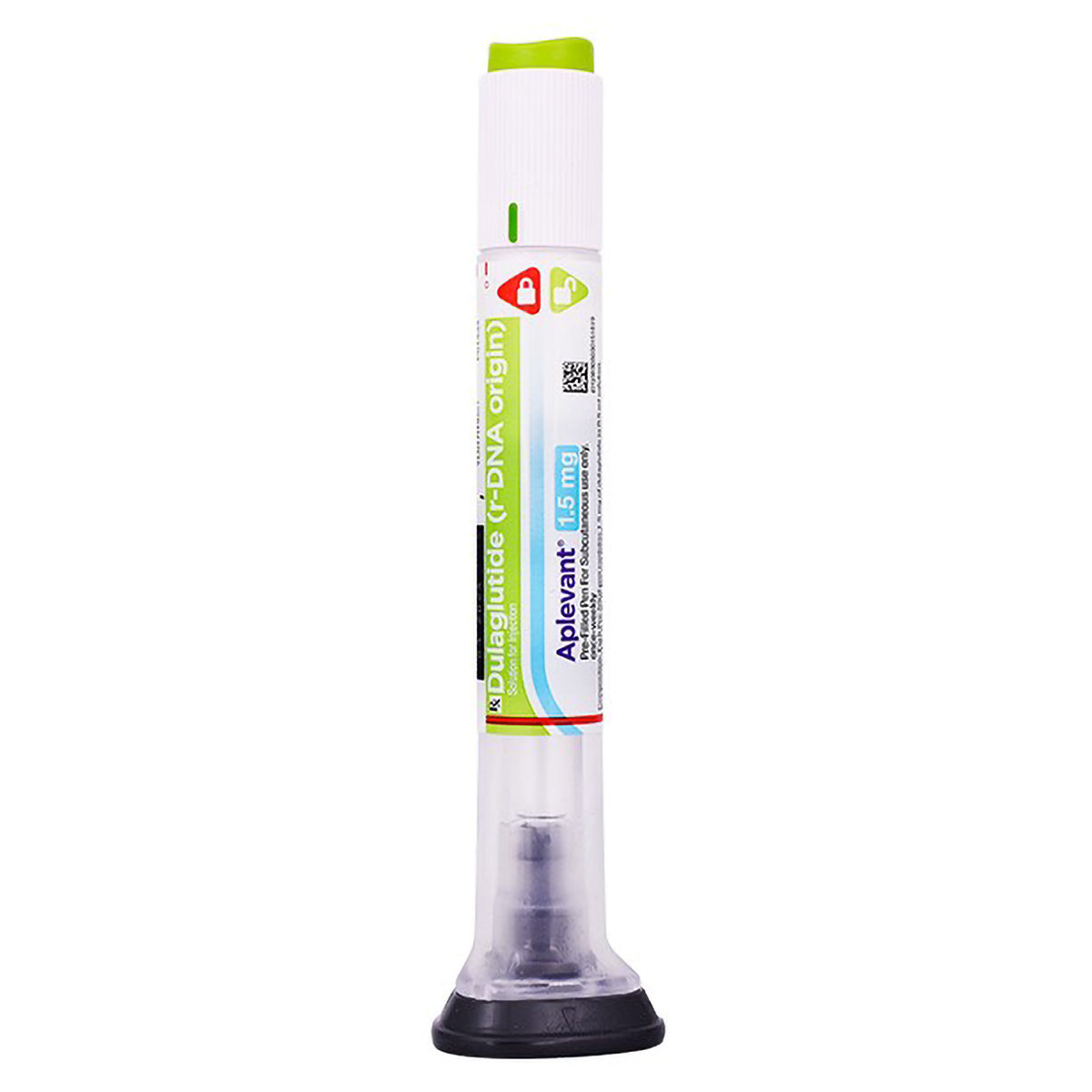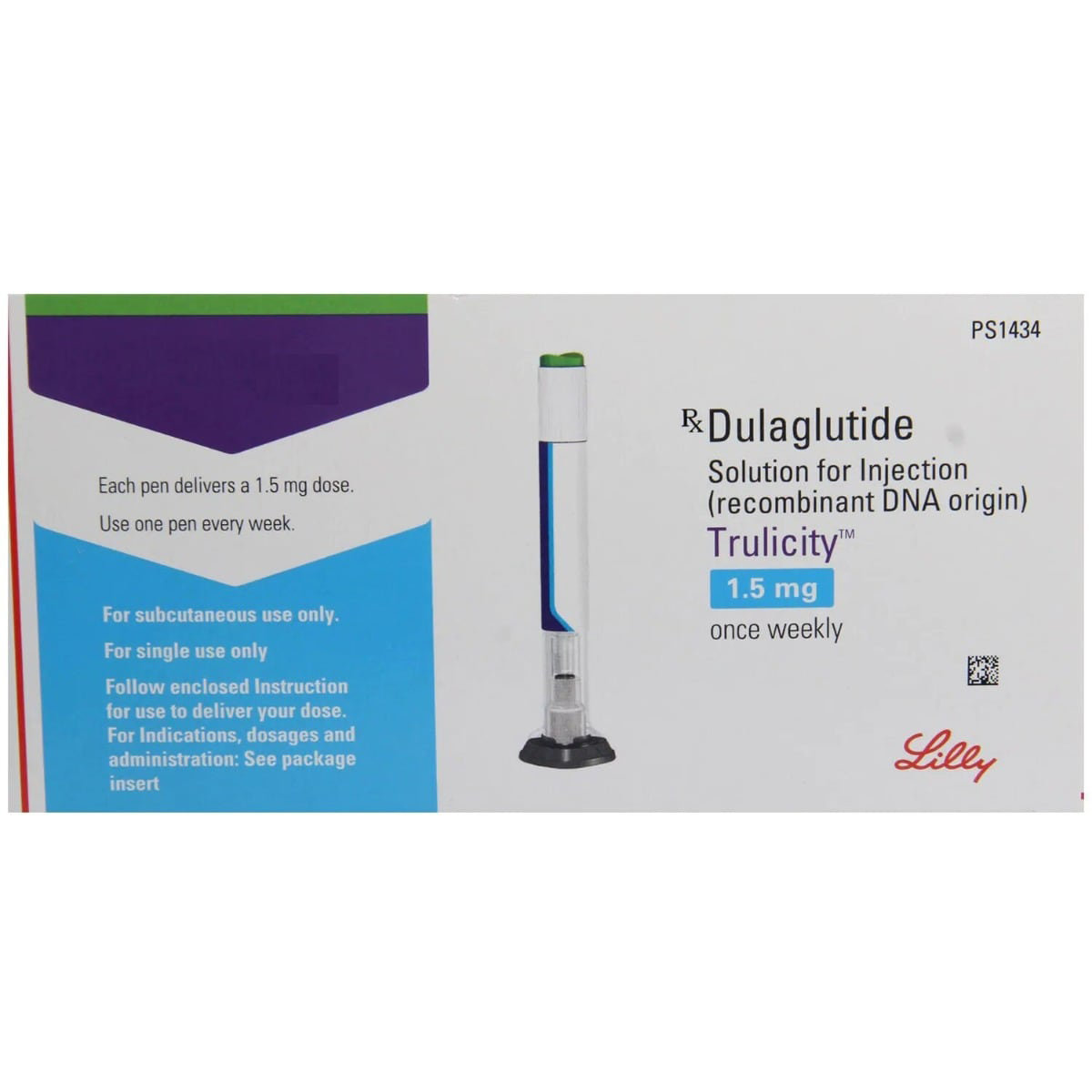Dulaglutide
About Dulaglutide
Dulaglutide belongs to the class of anti-diabetic drugs primarily used to treat type 2 diabetes mellitus. Diabetes mellitus is a metabolic disease that causes high blood sugar levels. It occurs when the insulin (a hormone produced by the beta cells of the pancreas) is resistant in breaking down glucose to produce energy (insulin resistance) or the pancreas produces little or no insulin at all.
Dulaglutide contains Dulaglutide, which belongs to the class of ‘incretin mimetics’. Dulaglutide works by increasing insulin release from the pancreas during high blood sugar levels (after meals) and decreasing the amount of sugar the liver makes. Dulaglutide also prevents the risk of heart diseases in type 2 diabetes patients.
Your doctor will decide the dose and duration of Dulaglutide based on your medical condition. Some common side effects of Dulaglutide include nausea, vomiting, diarrhoea, decreased appetite, stomach pain, constipation, and feeling tired. These side effects are not familiar to everyone and vary individually. If you notice any side effects that are not manageable, please consult your doctor.
Before starting Dulaglutide, please inform your doctor if you have a history of heart, kidney, or liver disease. It is advised to limit your alcohol intake while using Dulaglutide to avoid low blood sugar levels. Pregnant and breastfeeding women should consult their doctor before starting Dulaglutide. Dulaglutide may make you feel tired, hence drive and operate machinery only when you are feeling better. Dulaglutide is not recommended for children and adolescents under 18 years of age.
Uses of Dulaglutide
• Management of Type 2 Diabetes: Dulaglutide helps lower blood sugar levels in individuals diagnosed with type 2 diabetes.
• Improvement of Insulin Sensitivity: Dulaglutide enhances the action of insulin, making the body's tissues more responsive to it.
• Reduction of Cardiovascular Risks: Regular use of Dulaglutide can help reduce the risk of cardiovascular diseases in diabetic patients.
• Control of Blood Sugar Levels Post Meals: Dulaglutide assists in lowering postprandial blood sugar spikes, which is beneficial for overall diabetes management.
Medicinal Benefits
Dulaglutide is used to treat type 2 diabetes mellitus. It is an incretin mimetic that mimics the action of a natural hormone called Incretin (a metabolic hormone that stimulates a decrease in blood glucose levels). It works by increasing insulin release from the pancreas during high blood sugar levels (after meals) and decreasing the amount of sugar the liver makes. Dulaglutide also reduces the risk of serious heart diseases, such as heart attack or stroke in patients with type 2 diabetes and heart disease. Dulaglutide may be advised with or without other medications along with diet and exercise to control blood sugar levels.
Directions for Use
- Follow your doctor's instructions regarding the dosage and duration of treatment.
- Check the label for directions and use it as advised by the doctor. Dulaglutide should be injected subcutaneously (under the skin) on your stomach, thigh, or upper arm.
- Rotate the injection site each time.
- Never reuse or share dosing pens.
Storage
Side Effects of Dulaglutide
- Nausea
- Vomiting
- Diarrhoea
- Decreased appetite
- Stomach pain
- Constipation
- Feeling tired
Drug Warnings
Brief your medical history to the doctor if you have heart, kidney or liver diseases, pancreatitis (inflammation of the pancreas), stomach disorders like acid reflux, gastroparesis (delayed gastric emptying), hypoglycaemia (low blood sugar levels), diabetic retinopathy, and type 1 diabetes before starting Dulaglutide. Dulaglutide is contraindicated in patients with multiple endocrine neoplasia type 2, diabetic ketoacidosis (diabetes complication where the body produces excess blood acids (ketones)), and personal or family history of thyroid cancer. Do not share an injection pen, cartridge, or syringe with another person, even if the needle is changed. It is advised to limit your alcohol intake while using Dulaglutide to avoid low blood sugar levels. Pregnant and breastfeeding women should consult their doctor before starting this medication. Dulaglutide may cause you to feel tired; therefore, refrain from driving and operating machinery until you are feeling better. Dulaglutide is not recommended for children and adolescents under 18 years of age.
Drug Interactions
Drug-Drug Interaction: Dulaglutide may interact with other anti-diabetic medicines (insulin glargine), hormones (levothyroxine), high blood pressure medicines (propranolol, metoprolol), and glaucoma eye drops (timolol).
Drug-Food Interaction: Limit alcohol intake since it affects blood sugar levels. Avoid fatty foods and include healthy carbohydrates in your diet.
Drug-Disease Interaction: Tell your doctor before taking Dulaglutide if you have a medical history of allergic reactions to medicines, heart, kidney or liver diseases, pancreatitis, gastroparesis, reflux, and hypoglycaemia. Dulaglutide is contraindicated in patients with multiple endocrine neoplasia type 2, diabetic ketoacidosis, and personal or family history of thyroid cancer.
Drug-Drug Interactions Checker List:
Safety Advice

Alcohol
unsafeIt is advised to limit alcohol intake since it may worsen the side effects and increase the risk of developing low blood sugar levels.

Pregnancy
consult your doctorPlease consult your doctor before starting Dulaglutide if you are pregnant or planning to conceive. Your doctor will prescribe only if the benefit outweighs the risk.

Breast Feeding
consult your doctorThere is insufficient data on how Dulaglutide affects breastfeeding. It is safe to seek medical advice before starting Dulaglutide if you are lactating.

Driving
cautionDo not drive or operate machinery if you experience any signs of low blood sugar.

Liver
consult your doctorLet your doctor know if you have any history of liver diseases or hepatic impairment when prescribed Dulaglutide.

Kidney
consult your doctorLet your doctor know if you have any history of kidney disease when you are prescribed Dulaglutide.

Children
unsafeDulaglutide is not recommended for children and adolescents under 18 years of age.
Habit Forming
Diet & Lifestyle Advise
- Maintain a fibre-rich diet and include healthy carbohydrates from fruits, vegetables and whole grains to maintain your blood glucose levels.
- Eat at regular intervals.
- Monitor your weight and exercise regularly to maintain a healthy heart.
- Follow your doctor's guide on noticing and managing the early symptoms of high/low blood sugar levels.
- Gastrointestinal side effects can be managed with simple lifestyle modifications. These include cutting down on sugars and fatty foods, avoiding carbonated drinks and foods that cause gas.
Special Advise
It is advised to monitor your blood sugar levels regularly.
Patients Concern
Disease/Condition Glossary
Diabetes mellitus is a metabolic disease characterised by elevated blood sugar levels. Diabetes mellitus is also known as type 2 diabetes, also referred to as adult-onset diabetes. It occurs when the insulin (a hormone produced by the beta cells of the pancreas) is resistant in breaking down glucose to produce energy (insulin resistance) or the pancreas (an organ behind the stomach) produces little or no insulin at all. This disease mainly occurs in people above 40 years, but can also occur in childhood based on the risk factors. The treatment includes oral glucose-lowering medicines and insulin shots.
FAQs
Dulaglutide belongs to the class of anti-diabetic drugs primarily used to treat type 2 diabetes mellitus.
Dulaglutide contains Dulaglutide, which increases the insulin release from the pancreas after meals when your body has high blood glucose levels. Thus, Dulaglutide helps lower the blood sugar levels in type 2 diabetes mellitus.
Dulaglutide may cause low blood sugar levels (hypoglycaemia) and can make you hungry, dizzy, irritable, confused, anxious, or shaky. Hence, it is advised to take Dulaglutide with a meal. To immediately treat hypoglycaemia, it is advised to eat or drink fast-acting sugar sources like fruit juices, hard candy, raisins, or non-diet soda.
Use injection solution only if it is clear, colourless, and contains no particles. Administer the injection subcutaneously (under the skin) in the abdomen, thigh or upper arm. Your doctor or nurse will guide you on how to use the injection. You can take Dulaglutide with or without a meal. However, it is advised to take the injection preferably with a meal since it lowers the blood sugar levels and may cause gastrointestinal side effects. Do not share an injection pen, cartridge, or syringe with another person, even if the needle is changed.
Your doctor may advise Dulaglutide with or without other medications to control your blood sugar levels. Take Dulaglutide with other anti-diabetic medicines only if prescribed by the doctor. If you are also prescribed insulin, take Dulaglutide and insulin injections separately. Please do not mix them. You can inject both injections in the same body region, but the injection sites should not be next to each other.
Take the missed dose as soon as possible. However, if it is time for the next dose, skip the missed dose and return to your regular dosing schedule. Do not double the dose.
Store the unused Dulaglutide in a refrigerator at 2°C to 8°C protected from the light. You may also store Dulaglutide at a room temperature of 15°C to 30°C for up to 14 days before use. Do not freeze Dulaglutide. Do not use Dulaglutide if it is frozen.
Cut back on foods high in sodium, alcohol, fried foods, and high-carb food and drinks like sugary drinks, drinks with added sugar, white rice and starchy vegetables.
Dulaglutide should not be discontinued without a doctor's consultation. Consult the doctor if you feel uncomfortable after taking Dulaglutide.
The injection site should be changed to prevent skin changes, such as lumps under the skin. Dulaglutide may not work well if injected into the lumpy area.
Maintain a healthy diet and exercise regularly. Limit sugar intake and avoid smoking & alcohol consumption. Manage stress by doing meditation or yoga.
Hypoglycaemia (low blood sugar) may occur because you inject too much insulin, miss or delay meals, do not eat enough, eat food containing less carbohydrate than usual, drink alcohol, lose carbohydrates due to vomiting or diarrhoea, do more exercise than usual or a different type of physical activity, are recovering from an injury, illness, operation or stress, or are taking/have stopped taking other medicines.
A haemoglobin A1C (HbA1C) test is used to diagnose type 2 diabetes and prediabetes. It helps measure the amount of blood glucose attached to haemoglobin. It is used to monitor your condition and check how well you've been able to control your blood sugar levels.
Dulaglutide can be taken at any time of the day, with or without meals.
Dulaglutide slows down digestion, causing the person to eat less and leading to weight loss. However, Dulaglutide is not indicated for weight loss.
No, Dulaglutide is not an insulin. It contains Dulaglutide, an anti-diabetic drug.
Dulaglutide can be taken with insulin if prescribed by the doctor. Please do not mix them, take Dulaglutide and insulin separately. You may administer an injection of Dulaglutide and insulin in the same body area (such as the stomach area), but not directly adjacent to each other.
No, Dulaglutide is not used to treat type 1 diabetes. It is used to treat type 2 diabetes mellitus.
Dulaglutide may cause pancreatitis (inflammation of the pancreas). Stop using Dulaglutide and consult the doctor if you have severe pain in your stomach area (abdomen) that will not go away, with or without vomiting.
Regular self-monitoring of blood sugar may not be required while taking Dulaglutide. However, regular self-monitoring of blood sugar may be required while taking Dulaglutide with other anti-diabetic medicines.
Avoid foods high in sugar and fried or fatty foods. Also, avoid eating saturated, trans fats, and greasy foods.
Dulaglutide may cause serious side effects, such as possible thyroid tumours, including cancer. Inform your doctor if you notice symptoms of thyroid cancer, such as a lump or swelling in your neck, hoarseness, trouble swallowing, or shortness of breath.
Yes, Dulaglutide can be used in combination with other diabetes medications if prescribed by a doctor.
Yes, you can take a protein-rich diet along with Dulaglutide. Proteins which are building blocks of the body are one of the major energy providers. They break down into glucose to release energy.
Though artificial sweeteners may not affect blood sugar levels, it is advised to consult a doctor before using artificial sweeteners while taking Dulaglutide.
Uncontrolled diabetes may cause kidney problems leading to diabetic nephropathy. To prevent this, keep your blood sugar levels under control and regularly monitor your kidney function.
No, there is no cure for diabetes. However, using diabetic medicines and following diet and exercise may help manage diabetes.





